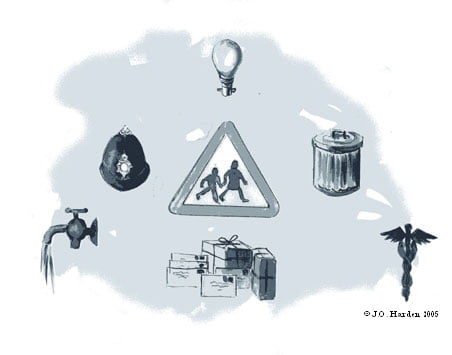
Law and Order
‘Until 1839 the policing of rural Wiltshire was the responsibility of the Parish or Petty Constables, whose ancestors dated from before the establishment of Parliament. Appointed by the Courts Leet, and latterly by the Magistrates in Quarter Session, the constables were supervised by the Magistrates. They were unpaid, untrained and usually unwilling to undertake any protracted investigation.’
extract from ‘The History of Wiltshire Constabulary’ by Paul Sample
Local Justice
Miscreants, once apprehended, were summarily dealt with, as the following report from the Salisbury and Winchester Journal shows:
‘17th January, 1757. At the Quarter Sessions of the Peace for the County of Wilts was ordered to be whipt, an old offender Robert Day of Fovant for wood stealing, who we are credibly informed, has been six times committed either to Fisherton Gaol, Devizes or Marlborough Bridewells for different offences in this County only.’
Robert Day would appear to have been an ‘old lag’, but to be whipped for stealing wood is a harsh punishment for a relatively minor offence.
More serious crimes, some of which concerned Fovant people, were not uncommon at this time. As was variously reported in the Salisbury and Winchester Journal:
‘Robert Futcher of Fovant was set upon by the notorious Bump-Cheek Edwards at Downton Fair (1786) … A horse was stolen from Francis Blundell of Fovant (1788) … the house of William Hayter of Fovant was broken into (1790) … Joel Coombs stole three pecks of wheat from the barn of Thomas Mills at Fovant (1811)’.
These are just a few of the crimes which were perpetrated in the area, many of which were largely beyond the competence of the Parish and Petty Constables.
In the absence of an effective police force, several Wiltshire communities formed private associations similar to this one advertised in the Salisbury and Winchester Journal of 15th March 1813:
Fovant Association for the Prevention of Crimes &c. The Annual meeting of the Association will be holden at the Pembroke Arms Inn, Fovant, on Wednesday next, the 27th inst. The members are requested to attend at 12 o’clock for particular business.
John Nicholson, Solicitor.
Barford
It is possible that this association emerged from the ‘Prevention of Robberies’ group, which is mentioned in the August 1792 report of the meeting of the Trustees of the Turnpike under Salisbury Plain, the current A30. This group offered payment of one guinea to informers. How effective such organisations were is open to doubt, but their very existence must have constituted something of a deterrent. However, these moves, which obviously only covered the immediate locality, were symptomatic of the more widespread national situation.
National Reform
The increasing incidence of crime in the country as a whole had been giving rise to public concern for a considerable period. Pressure for reform intensified as the general populace began to demand protection from such acts of violence. Eventually, after the passing into law of the 1829 Metropolitan Police Bill, the country got its first official police force – in London. Similarly, six years later, after the Municipal Corporations Act of 1835, Salisbury set up its own City Police force. It was not until after the County Police Act of 1839 was accepted by the Wiltshire Court of Quarter Sessions that the small villages of our county benefited from the establishment of a rural police force.
Once the County Police Act became law, action followed swiftly. Captain Samuel Meredith R.N., became the first Chief Constable of Wiltshire when he was confirmed in the post on 28th November 1839. It was a double first, for with this appointment Wiltshire became the first county in the country to have its own Chief Constable.
Meredith was faced with a formidable task. His brief was to:
‘raise a force of over 200 men, allocate them to areas of patrol, and arrange for their accommodation, supervision, clothing and discipline (and they were to) start their duties from January 1840 onwards’.
Extract from ‘The History of Wiltshire Constabulary’ by Paul Sample
Early in the 1970s the Fovant Police House was sold and became a private residence. Appropriately, the new owners named their house ‘Koppergon’.
Although the village has not suffered a great deal from crime in recent years, when a police sergeant in Salisbury asked if local villages would be interested in setting up Neighbourhood Watch schemes, Roy Nuttall volunteered to do so for Fovant. Accordingly, he instigated our group in October 1987. It is still going strong today and reports regularly in our village magazine and at Parish Council meetings.
Click on the links below to find more information on some history of Fovant’s policemen:
J.OH.
2005
Content last updated
20 November 2015
